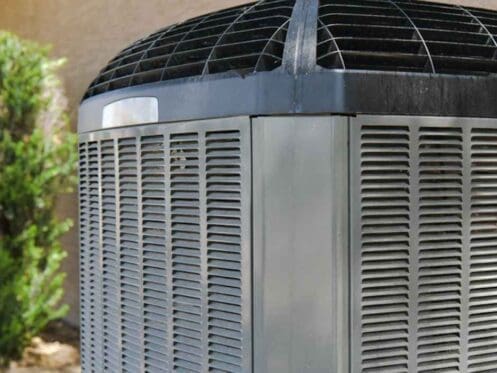Your HVAC system should operate smoothly with minimal noise. While a low hum from your air conditioner or furnace is normal, loud or unusual sounds could indicate a serious issue. If you’ve ever wondered, “Why is my HVAC making noise?”, it’s important to identify the sound and address the problem before it worsens.
A noisy air conditioner or loud furnace can result from anything from loose parts to major system malfunctions. Understanding these noises and their causes can help you determine whether a quick fix will solve the issue or if it’s time for professional HVAC repair.
Common HVAC Noises and What They Mean
Banging or Clanking
If your HVAC system is making loud banging or clanking noises, it could mean a loose or broken part inside the unit. In air conditioners, this might indicate compressor problems, while in furnaces, it could be a cracked heat exchanger or a failing blower motor.
If the sound is persistent, turn off your system and schedule an HVAC repair to prevent further damage.
Hissing or Whistling
A hissing or whistling sound is often caused by an air leak, either in the ductwork or within the system itself. In air conditioners, it can also indicate a refrigerant leak, which can reduce efficiency and harm the environment. If the noise comes from your furnace, it may suggest a dangerous gas leak that needs immediate attention.
If you suspect a refrigerant or gas leak, shut off your HVAC system and contact a professional immediately.
Clicking or Tapping
Some clicking sounds are normal when your system turns on or off. However, if the clicking continues, it could be due to an electrical issue such as a failing relay or capacitor. These components control power distribution, and if they fail, your system may stop working entirely.
Clicking sounds should be addressed by an HVAC technician to prevent unexpected breakdowns.
Buzzing or Humming
A buzzing or humming noise from your air conditioner could mean a variety of issues, including:
- Loose electrical connections
- A failing motor
- A clogged air filter
- Debris inside the outdoor unit
If the buzzing is coming from your furnace, it could indicate transformer problems or blower motor issues. In either case, professional servicing is recommended to prevent further damage.
Rattling or Vibrating
Rattling sounds often indicate loose panels, screws, or internal components. If your air conditioner noise gets louder over time, it could be a sign of more serious mechanical issues.
For furnaces, rattling can sometimes point to a cracked heat exchanger, which is a major safety concern. A technician can diagnose the problem and determine if repairs or a replacement are necessary.
Screeching or Squealing
A screeching HVAC noise is often due to worn-out or loose belts, a failing blower motor, or issues with motor bearings. These components need lubrication and occasional replacement to keep the system running smoothly.
If you hear a high-pitched squealing noise, it’s best to have your system checked before it overheats or stops working altogether.
Gurgling or Bubbling
A gurgling or bubbling sound from your air conditioner may be a sign of trapped air in the refrigerant lines or a clogged condensate drain. A clogged drain can lead to excess moisture buildup, which can cause water damage or mold growth.
Flushing the condensate line can sometimes fix the issue, but if the noise persists, a technician should inspect the system.
Why You Shouldn’t Ignore a Noisy HVAC System
Even if your system is still working, strange HVAC noises can indicate underlying problems that may lead to:
- Increased energy bills due to inefficient operation
- Costly repairs if minor issues are left unresolved
- Complete system failure if damage worsens
- Potential safety risks, such as electrical hazards or gas leaks
Addressing air conditioner sound issues early can prevent expensive repairs and extend the life of your system.
Preventing HVAC Noises: Maintenance Tips
To reduce the chances of unexpected air conditioner noise or loud furnace issues, follow these maintenance tips:
- Change your air filter regularly. A dirty filter restricts airflow, putting extra strain on your system.
- Inspect and clean the outdoor unit. Leaves, dirt, and debris can clog the system and cause unusual noises.
- Schedule routine tune-ups. Professional inspections help catch small issues before they turn into costly repairs.
- Tighten loose screws and panels. This can prevent rattling and unnecessary vibrations.
Regular maintenance not only helps prevent HVAC making noise problems but also ensures efficient performance year-round.
Schedule HVAC Repair with Charleston Heating & Air
A noisy air conditioner or loud furnace shouldn’t be ignored. Whether your system is banging, buzzing, hissing, or squealing, Charleston Heating & Air has the expertise to diagnose and repair the issue quickly.
If your HVAC system is making noise, don’t wait for the problem to worsen. Contact Charleston Heating & Air today for expert HVAC repair and reliable service!

